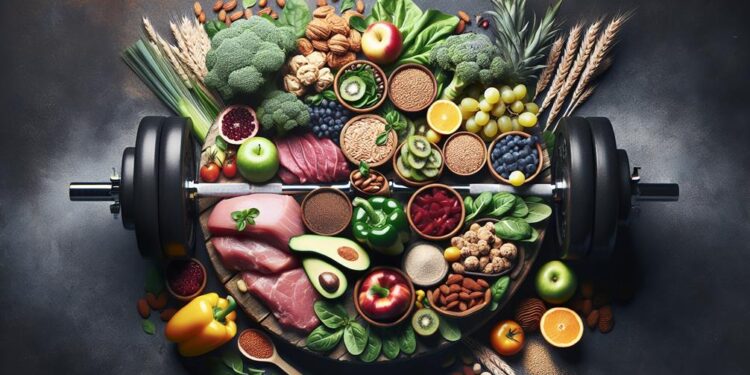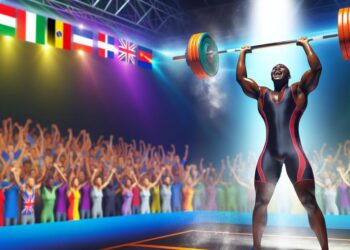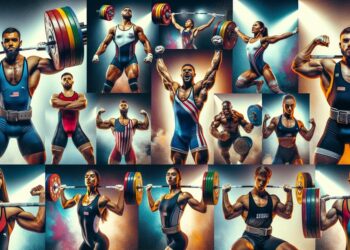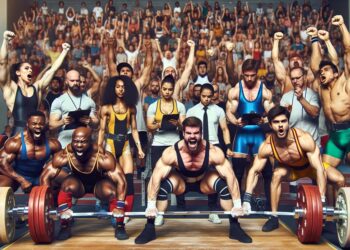Did you know that what you eat can have a significant impact on your strength and size gains in powerlifting? Many people focus solely on their training program, overlooking the crucial role that nutrition plays in achieving optimal results. Whether you're a beginner or an experienced lifter, having a well-designed diet plan tailored to powerlifting can make a world of difference in your performance and physique. In this discussion, we will explore the essential macro and micronutrient requirements, pre-workout nutrition strategies, post-workout recovery meals, meal timing and frequency, as well as the role of supplements in fueling your powerlifting journey. So, if you're ready to take your gains to the next level, let's dive into the world of powerlifting diet plans and unlock the secrets to maximizing your strength and size.
Key Takeaways
- Proper hydration is essential for powerlifters, aiming for 8-10 cups of water daily.
- Powerlifters should aim for a protein intake of 1.6-2.2 grams per kilogram of body weight per day, with good sources including lean meats, poultry, fish, eggs, dairy products, tofu, and legumes.
- Adequate intake of carbohydrates, fats, vitamins, and minerals is important for optimal performance and overall health.
- Pre- and post-workout nutrition strategies, including consuming a balanced meal or snack with carbohydrates, proteins, and fats, can enhance performance and support muscle growth and recovery.
Macro and Micronutrient Requirements
To optimize performance and support muscle growth, powerlifters must carefully consider their macro and micronutrient requirements. Proper hydration is of utmost importance for powerlifters. Water plays a crucial role in regulating body temperature, lubricating joints, and delivering nutrients to muscles. During intense training sessions, powerlifters lose significant amounts of water through sweat, making it essential to stay hydrated throughout the day. Aim to drink at least 8-10 cups (64-80 ounces) of water daily, and increase intake during workouts to replace lost fluids.
Protein is another essential nutrient for powerlifters, as it plays a vital role in muscle recovery and growth. Consuming an adequate amount of protein helps repair damaged muscle fibers and promotes muscle hypertrophy. Aim for a protein intake of 1.6-2.2 grams per kilogram of body weight per day, spread across multiple meals to optimize muscle protein synthesis. Good sources of protein for powerlifters include lean meats, poultry, fish, eggs, dairy products, and plant-based options like tofu and legumes.
Pre-Workout Nutrition Strategies
Properly fueling your body before a workout is essential for powerlifters to maximize performance and support muscle growth. Pre-workout nutrition strategies can play a crucial role in providing the necessary energy and nutrients for a successful training session. Here are some key considerations to keep in mind:
- Importance of hydration: Staying hydrated is vital for optimal performance. Adequate water intake helps maintain blood volume, regulate body temperature, and transport nutrients to working muscles. Make sure to drink enough water throughout the day, and especially before your workout, to prevent dehydration and maintain peak performance.
- Role of caffeine in pre-workout nutrition: Caffeine is a popular pre-workout supplement that can enhance performance. It stimulates the central nervous system, increases alertness, and may delay fatigue. However, it's important to note that individual responses to caffeine can vary, and excessive consumption may lead to adverse effects such as jitters or disrupted sleep. Consult with a healthcare professional to determine the appropriate dosage and timing for your needs.
- Balanced macronutrient intake: Fueling your body with a combination of carbohydrates, proteins, and fats before a workout can provide sustained energy and support muscle growth. Aim for a balanced meal or snack containing complex carbohydrates, lean proteins, and healthy fats to optimize performance and recovery.
- Timing of pre-workout meals: The timing of your pre-workout meal or snack can influence digestion and energy availability during exercise. Generally, it's recommended to consume a meal or snack containing carbohydrates and proteins 1-3 hours before your workout to allow for proper digestion and nutrient absorption. Experiment with different timings to find what works best for your body.
Post-Workout Recovery Meals
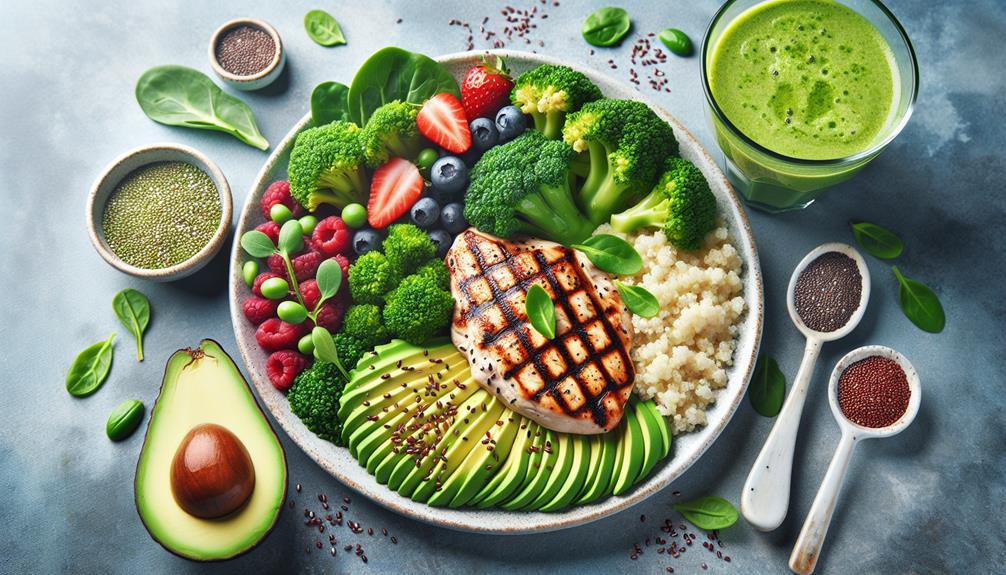
After completing a powerlifting workout, it is important to prioritize your post-workout recovery meals to promote muscle repair and growth. Your muscles go through a lot of stress during exercise, and providing them with the nutrients they need afterward is crucial for optimal recovery. One key nutrient to focus on is protein, as it plays a vital role in muscle repair. Aim for an optimal protein intake of around 0.6 to 0.9 grams per pound of body weight. This can be achieved through sources such as lean meats, poultry, fish, eggs, dairy products, and plant-based proteins like tofu and legumes.
In addition to protein, carbohydrates are also important for replenishing glycogen stores and providing energy for your muscles. Including a source of carbohydrates in your post-workout meal, such as whole grains, fruits, or potatoes, can help with muscle recovery and restore energy levels.
Timing is also crucial when it comes to post-workout nutrition. It is recommended to consume your post-workout meal within 1 to 2 hours after exercise to maximize muscle repair and recovery.
Remember to hydrate well after your workout as well. Water is essential for proper muscle function and helps with nutrient absorption.
Meal Timing and Frequency
When it comes to optimizing your powerlifting diet, it's important to consider meal timing and frequency to ensure you're fueling your body effectively for performance and recovery. Here are some key points to keep in mind:
- Intermittent Fasting: Some powerlifters incorporate intermittent fasting into their diet plans. This eating pattern involves alternating periods of fasting and eating. It can help with calorie control and may have potential benefits for fat loss and insulin sensitivity. However, it's important to ensure that you're still meeting your calorie and nutrient needs within the eating window.
- Calorie Counting: Tracking your calorie intake is crucial when it comes to achieving your powerlifting goals. Knowing how many calories you're consuming can help you maintain a calorie surplus for muscle growth or a calorie deficit for weight loss. It's important to find the right balance that suits your individual needs and goals.
- Meal Frequency: There isn't a one-size-fits-all approach to meal frequency for powerlifters. Some prefer to eat three larger meals, while others prefer to have smaller, more frequent meals throughout the day. Find a meal frequency that works best for you and helps you meet your calorie and macronutrient goals.
- Pre- and Post-Workout Meals: Fueling your body properly before and after your workouts is essential for optimal performance and recovery. Aim to consume a balanced meal containing carbohydrates and protein about 1-2 hours before your training session. After your workout, focus on replenishing your glycogen stores and promoting muscle repair and growth by consuming a protein-rich meal or snack.
Supplements for Powerlifters
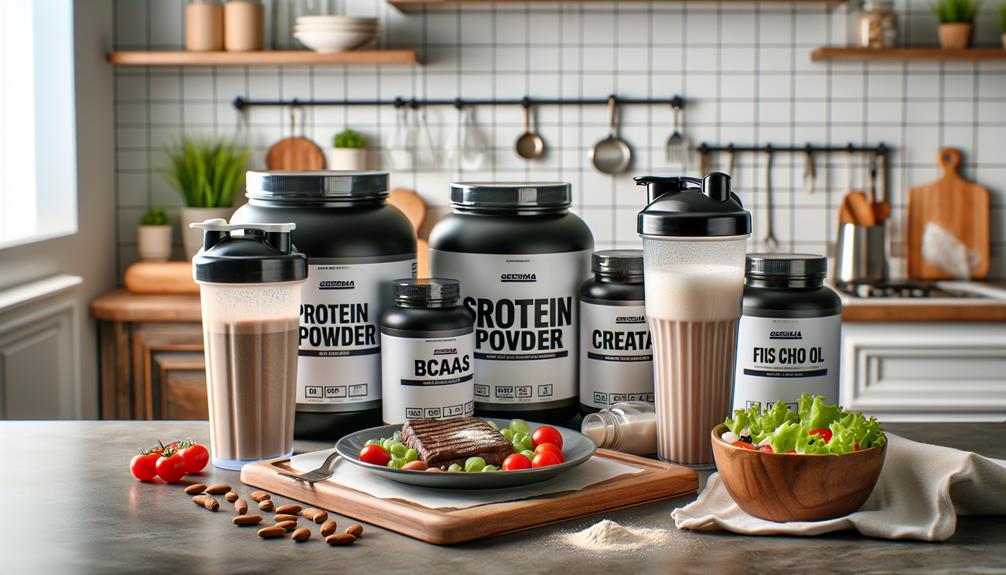
To optimize your powerlifting performance and support your training goals, incorporating supplements into your diet can be beneficial. Two popular supplements among powerlifters are protein powders and creatine. Protein powders, such as whey protein, are a convenient and efficient way to increase your protein intake. Protein is essential for muscle repair and growth, and consuming enough protein is crucial for powerlifters to support their training and recovery. Protein powders can be easily mixed with water or milk and consumed before or after workouts to enhance muscle protein synthesis.
Another supplement that has been extensively studied and shown to improve strength and power performance is creatine. Creatine supplementation has been found to increase muscle mass, strength, and power output, making it an ideal supplement for powerlifters. Creatine works by increasing the availability of ATP, the primary energy source for muscle contractions, allowing for more intense and powerful lifts. It is recommended to take 3-5 grams of creatine monohydrate daily, either before or after workouts, to maximize its benefits.
While protein powders and creatine are two popular and effective supplements for powerlifters, it is important to note that they should not replace a well-balanced diet. Supplements should be used to complement a nutritious eating plan rather than as a substitute for whole foods. Additionally, it is always recommended to consult with a healthcare professional or registered dietitian before starting any new supplement regimen.
Frequently Asked Questions
Can Powerlifters Follow a Vegetarian or Vegan Diet and Still Meet Their Macro and Micronutrient Requirements?
Yes, you can follow a vegetarian or vegan powerlifting diet and still meet your macro and micronutrient requirements. By incorporating plant-based protein sources like tofu, lentils, and quinoa, and supplementing with B12 and iron, you can fuel your strength and size goals.
How Should Powerlifters Adjust Their Pre-Workout Nutrition Strategies if They Train Early in the Morning?
To optimize your morning workouts, adjust your pre-workout nutrition strategy. Consider the benefits of fasting before training, as it can enhance fat burning and improve insulin sensitivity. Experiment and find what works best for your body.
What Are Some Recommended Post-Workout Recovery Meals for Powerlifters Who Have Dietary Restrictions or Food Allergies?
If you have dietary restrictions or food allergies, there are still plenty of post-workout recovery meal alternatives available to you. Powerlifting diet alternatives can include options like plant-based protein sources, gluten-free carbohydrates, and allergen-free supplements.
Is It Necessary for Powerlifters to Eat a Certain Number of Meals per Day, or Is Meal Timing and Frequency Flexible?
You have the freedom to choose your meal timing and frequency as a powerlifter. Intermittent fasting can offer benefits, but it's important to consider the impact of meal timing on your performance.
Are There Any Specific Supplements That Are Particularly Beneficial for Powerlifters Who Are Looking to Improve Their Performance and Recovery?
When it comes to supplement recommendations for powerlifters, there are a few key ones to consider. Creatine can help improve strength and power, while protein powder aids in muscle recovery. Fish oil is also beneficial for reducing inflammation.
Conclusion
In conclusion, the powerlifting diet plays a crucial role in providing the necessary nutrition for strength and muscle growth. By understanding your macro and micronutrient requirements, incorporating pre-workout strategies, consuming post-workout recovery meals, and considering meal timing and frequency, you can enhance your performance and reach your goals. Additionally, supplements can provide an extra boost, but it's important to remember that they should not replace a well-rounded diet. Are you ready to take your powerlifting journey to the next level?


